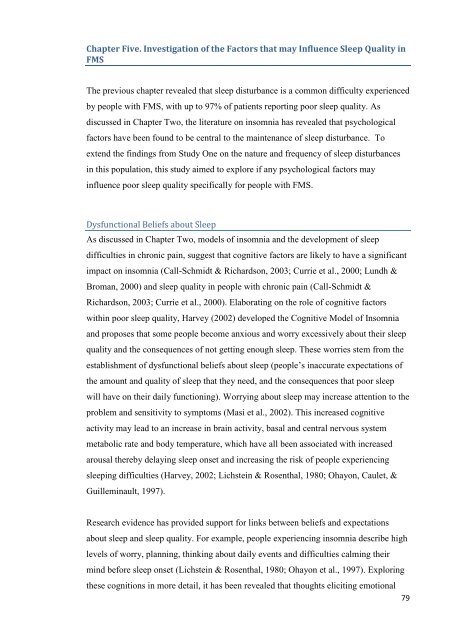Sick and Tired: Understanding and Managing Sleep Difficulties in ...
Sick and Tired: Understanding and Managing Sleep Difficulties in ...
Sick and Tired: Understanding and Managing Sleep Difficulties in ...
Create successful ePaper yourself
Turn your PDF publications into a flip-book with our unique Google optimized e-Paper software.
Chapter Five. Investigation of the Factors that may Influence <strong>Sleep</strong> Quality <strong>in</strong><br />
FMS<br />
The previous chapter revealed that sleep disturbance is a common difficulty experienced<br />
by people with FMS, with up to 97% of patients report<strong>in</strong>g poor sleep quality. As<br />
discussed <strong>in</strong> Chapter Two, the literature on <strong>in</strong>somnia has revealed that psychological<br />
factors have been found to be central to the ma<strong>in</strong>tenance of sleep disturbance. To<br />
extend the f<strong>in</strong>d<strong>in</strong>gs from Study One on the nature <strong>and</strong> frequency of sleep disturbances<br />
<strong>in</strong> this population, this study aimed to explore if any psychological factors may<br />
<strong>in</strong>fluence poor sleep quality specifically for people with FMS.<br />
Dysfunctional Beliefs about <strong>Sleep</strong><br />
As discussed <strong>in</strong> Chapter Two, models of <strong>in</strong>somnia <strong>and</strong> the development of sleep<br />
difficulties <strong>in</strong> chronic pa<strong>in</strong>, suggest that cognitive factors are likely to have a significant<br />
impact on <strong>in</strong>somnia (Call-Schmidt & Richardson, 2003; Currie et al., 2000; Lundh &<br />
Broman, 2000) <strong>and</strong> sleep quality <strong>in</strong> people with chronic pa<strong>in</strong> (Call-Schmidt &<br />
Richardson, 2003; Currie et al., 2000). Elaborat<strong>in</strong>g on the role of cognitive factors<br />
with<strong>in</strong> poor sleep quality, Harvey (2002) developed the Cognitive Model of Insomnia<br />
<strong>and</strong> proposes that some people become anxious <strong>and</strong> worry excessively about their sleep<br />
quality <strong>and</strong> the consequences of not gett<strong>in</strong>g enough sleep. These worries stem from the<br />
establishment of dysfunctional beliefs about sleep (people‟s <strong>in</strong>accurate expectations of<br />
the amount <strong>and</strong> quality of sleep that they need, <strong>and</strong> the consequences that poor sleep<br />
will have on their daily function<strong>in</strong>g). Worry<strong>in</strong>g about sleep may <strong>in</strong>crease attention to the<br />
problem <strong>and</strong> sensitivity to symptoms (Masi et al., 2002). This <strong>in</strong>creased cognitive<br />
activity may lead to an <strong>in</strong>crease <strong>in</strong> bra<strong>in</strong> activity, basal <strong>and</strong> central nervous system<br />
metabolic rate <strong>and</strong> body temperature, which have all been associated with <strong>in</strong>creased<br />
arousal thereby delay<strong>in</strong>g sleep onset <strong>and</strong> <strong>in</strong>creas<strong>in</strong>g the risk of people experienc<strong>in</strong>g<br />
sleep<strong>in</strong>g difficulties (Harvey, 2002; Lichste<strong>in</strong> & Rosenthal, 1980; Ohayon, Caulet, &<br />
Guillem<strong>in</strong>ault, 1997).<br />
Research evidence has provided support for l<strong>in</strong>ks between beliefs <strong>and</strong> expectations<br />
about sleep <strong>and</strong> sleep quality. For example, people experienc<strong>in</strong>g <strong>in</strong>somnia describe high<br />
levels of worry, plann<strong>in</strong>g, th<strong>in</strong>k<strong>in</strong>g about daily events <strong>and</strong> difficulties calm<strong>in</strong>g their<br />
m<strong>in</strong>d before sleep onset (Lichste<strong>in</strong> & Rosenthal, 1980; Ohayon et al., 1997). Explor<strong>in</strong>g<br />
these cognitions <strong>in</strong> more detail, it has been revealed that thoughts elicit<strong>in</strong>g emotional<br />
79

















